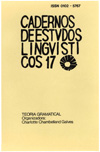Resumo
-Referências
BABBY, L. (1973). The Deep Structure of Adjectives and Participles in Russian. Language, 49,349-60.
BORGES, J. (1979). Adjetivos: predicados extensionais e intensionais. Dissertação de Mestrado, UNICAMP, Campinas.
CHOMSKY, N. (1981). Lectures on Government and Binding. Dordrecht.
CHOMSKY, N. (1982). Some Concepts and Consequences of the Theory of Govemment and Binding. MIT Press, Cambridge, Massachusets.
CHOMSKY, N. (1986) Knowledge of language. Praeger, New York.
GUNNARSON, K. (18986). Predicative Structures and Projections of Lexical Dependences. LI, 17, 13-47.
JACKENDOFF, R. (1972). Semantic lnterpretation in Generative Grammar. MIT Press, Cambridge, Massachusets.
MARANTZ, A. (1984). On the Nature of Grammatical Relations. MIT Press, Cambridge, Massachusets.
NEIDLE, C. (1982). Case Agreement in Russian. In: J. Bresnan (ed.) The Mental Representations of Gramatical Relations. MIT Press, Cambridge, Massachusets.
PIMENTA-BUENO, M. do N.S. (1986). As formas V+do em português: um estudo de classes de palavras. D.E.L.T.A., v.2, n"' 2, 207-29.
ROZENTAL, D.E. (ed.) (1984). Souvremennyj russkij jazyk (língua russa moderna). Moskva, Vys aja kola.
SIEGEL, M. (1976). Capturing the Russian Adjective. In: B. Partee (ed.) Montague Grammar. Academic Press, New York.
STOWEL, T. (1981). Origins of Phrase Structure. Doctoral Dissertation, MIT, Cambridge, Massachusets.
O periódico Cadernos de Estudos Linguísticos utiliza a licença do Creative Commons (CC), preservando assim, a integridade dos artigos em ambiente de acesso aberto.

